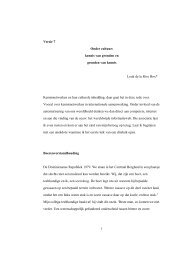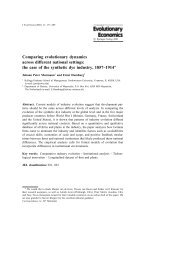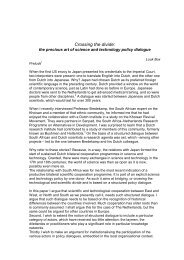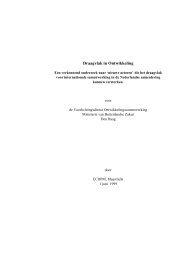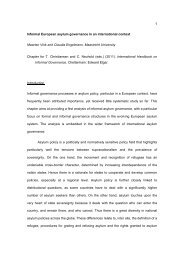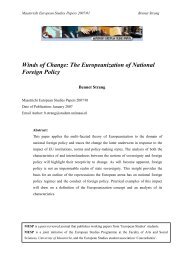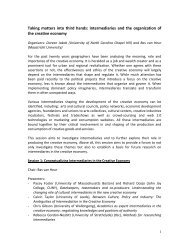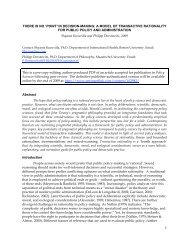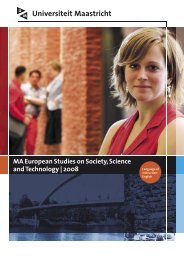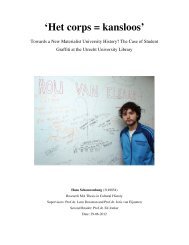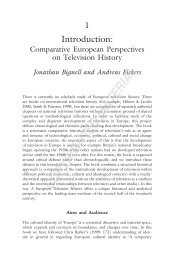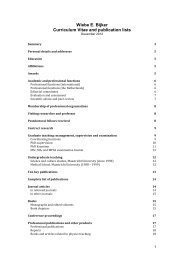Download paper - Maastricht University
Download paper - Maastricht University
Download paper - Maastricht University
Create successful ePaper yourself
Turn your PDF publications into a flip-book with our unique Google optimized e-Paper software.
<strong>Maastricht</strong> European Studies Papers 2007/07 L. Unbehauen<br />
Van der Wende, 2004, p. 353). The apparent policy consensus, encouraged by the<br />
Commission, is challenged by national actors who raise objections in more sensitive areas.<br />
Six of these caveats are especially pressing. The first is the possible imbalance between<br />
incoming and outgoing international students (p. 353). How many international scholars are<br />
entering a system, will definitely depend on the attractiveness and status of the respective<br />
national higher education structure. Consequently, domestic policy-makers in countries with<br />
weaker and less reputable education systems fear that this could lead to a so-called brain-drain<br />
of their highly skilled student force. However, it should be acknowledged that this can also<br />
give the necessary push for such systems to modernize. Furthermore, one should keep in mind<br />
that most students, even if studying abroad, will in most cases return back home after<br />
receiving their degree because of cultural and family ties.<br />
The second area of national resentment is the restructuring of the national educational<br />
systems and the incompatibility of the new two-cycle arrangement with the traditional degree<br />
structure. Despite the easy transition in some countries, others have been more reluctant to<br />
introduce the Bachelor and Master structure. While the frontrunner Netherlands have<br />
introduced the ECTS and two-cycle system already in 2002/03 and have adjusted 82% of its<br />
academic programs (Leegwater, 2005, p. 5), Germany can only offer 26, 3 % of its degree<br />
programs according to the new system. The new structures exist parallel to the ‘traditional’<br />
German degrees, such as Magister and Diplom (Galler & Hendriks, 2005, p. 1). The belated<br />
switch to the two-cycle system, which is planned by 2009/10, is due to the decentralized<br />
structure of the German higher education sector and the Kulturhoheit (cultural autonomy) of<br />
Germany’s Länder who can act as veto players in the restructuring process. In the UK the<br />
two-cycle structure is not easily compatible with its traditional two-year foundation degrees<br />
and in Portugal there is disagreement on the duration of the first cycle. Greece is lagging<br />
behind, also due to the resistance to restructuring by its academic elite and student bodies.<br />
Here academics are frightened that pressures such as internationalization and globalization<br />
could ultimately result in the degradation of the public university (Reichert & Tauch, 2003).<br />
Another national concern, voiced by the Portuguese scholars Amaral and Magalhães is<br />
the possible loss of the most unique feature of the European Higher Education system: its<br />
diversity. The argument is that harmonization and the introduction of a more uniform and<br />
centrally planned European core curriculum, as recommended in the 2001 ‘Tuning<br />
Educational Structures in Europe’ project 6 , will increase bureaucracy and will stifle program<br />
6 The tuning project was launched on May 4 th 2001with financial support of the Commission to exchange<br />
information and to pinpoint some common subject-based reference points, curriculum content, learning<br />
outcomes and teaching methods in order to advance the quality of European higher education. In the area of<br />
12



